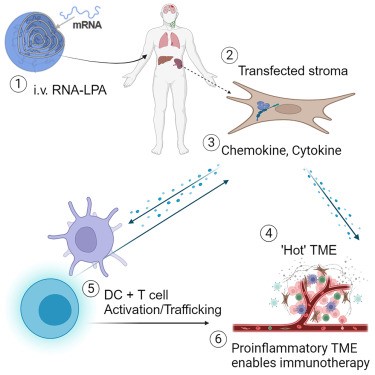In a first-of-its-kind human clinical trial involving four adult patients, an mRNA cancer vaccine developed by the University of Florida rapidly reprograms the immune system to attack glioblastoma, the most aggressive and deadly brain tumor.
These results reflect the treatment outcomes of 10 pet dogs with naturally occurring brain tumors, whose owners agreed to participate in the treatment as they had no other options, as well as the results of a preclinical mouse model. This breakthrough will now be tested in a pediatric phase 1 clinical trial for the treatment of brain cancer. The findings were published in the May 9, 2024, issue of the journal Cell, titled “RNA aggregates harness the danger response for potent cancer immunotherapy”.
This discovery represents a potential new approach to recruit the immune system against the notoriously treatment-resistant cancer using mRNA technology and iterations of lipid nanoparticles, similar to the COVID-19 vaccine. However, it has two key differences: the use of the patient’s own tumor cells to construct a personalized vaccine and a newly designed complex delivery mechanism.
Elias Sayour, the corresponding author of the paper and a pediatric oncologist at the University of Florida, said, “Instead of a single type of particle, we’re injecting clusters of particles wrapped together like an onion, like a bag of onions. We are able to do this in the context of cancer because these clusters of particles alert the immune system in a much more profound way than a single particle.” Like other immunotherapies, this newly developed vaccine attempts to “educate” the immune system to recognize the tumor as foreign.
One of the most impressive findings, Sayour says, is that the new vaccine, given intravenously, quickly provokes a strong response from the immune system that rejects the tumor. “In less than 48 hours, we can see these tumors go from what we call ‘cold’ tumors — immune cold, very few immune cells, very silent immune response — to ‘hot’ tumors, with a very active immune response,” he said. “It’s very surprising given how quickly this is happening, and it tells us that we are able to activate the early parts of the immune system very quickly to fight these cancers, which is critical for unlocking the late effects of the immune response.”
Glioblastoma is one of the most devastating cancers, with a median survival of about 15 months. The current standard of care includes surgery, radiotherapy, and some combination of chemotherapy.
The newly published paper is the culmination of promising translational results from seven years of research by the authors, who began with a preclinical mouse model and then experimented with 10 pet dogs with spontaneous advanced brain cancer, who had no other treatment options.
This experiment on pet dogs was conducted with the consent of the owner. Dr. Sheila Carrera-Justiz, a veterinary neuroscientist at the University of Florida College of Veterinary Medicine, said dogs provide a naturally occurring model for malignant gliomas because they are the only species with a high incidence of spontaneous brain tumors. She noted that gliomas in dogs are generally terminally ill.
After treating pet dogs with spontaneous brain cancer with a personalized mRNA vaccine, Sayour’s team advanced their research into a small, clinical trial to ensure safety and test feasibility before scaling up to a larger clinical trial.

Fig.1 mRNA Vaccine for Cancer Therapy.1
In a cohort of four patients, genetic material called mRNA was extracted from each patient’s own surgically removed brain tumor. This mRNA was then amplified and wrapped in a high-tech package of newly designed biocompatible lipid nanoparticles. These nanoparticles made the tumor cells “look” like a dangerous virus when reinjected into the bloodstream, eliciting a response from the immune system. This personalized mRNA vaccine is individually designed for each patient with the goal of maximizing the use of their unique immune system.
“Making mRNA cancer vaccines in this way can produce similar and strong responses in mice, pet dogs that spontaneously develop cancer, and human brain cancer patients,” said Duane Mitchell, co-author of the paper and director of the Institute for Clinical and Translational Science at the University of Florida. “This is a very important finding because we often don’t know if preclinical studies in animals translate into similar responses in patients. mRNA vaccines and therapeutics have undoubtedly been a hot topic since the COVID-19 pandemic, but this is a novel and unique way of delivering mRNA that can generate these really significant and rapid immune responses that we see in animals and humans.”
While it is too early to evaluate the clinical efficacy of this personalized mRNA vaccine in the early stages of this clinical trial, the disease-free survival of these four patients was longer than expected. In addition, the median survival of the ten pet dogs after receiving this personalized mRNA vaccine injection was 139 days, compared to the typical 30 to 60 days for dogs with this disease.
As a next step, the authors will expand the Phase 1 clinical trial to include up to 24 adult and pediatric patients to validate their findings. Once the optimal safe dose is confirmed, an estimated 25 children will be enrolled in the Phase 2 clinical trial.
Despite the encouraging results, the authors acknowledge that there is still uncertainty about how best to use the immune system while minimizing potential adverse side effects. “I hope this could be a new paradigm for us to treat patients, a new platform technology for us to modulate the immune system.”
Creative Biolabs is a leader in the field of cancer vaccines. We provide development services for different types of cancer vaccines, including:
Reference
- Mendez-Gomez, Hector R., et al. “RNA aggregates harness the danger response for potent cancer immunotherapy.” Cell10 (2024): 2521-2535.
